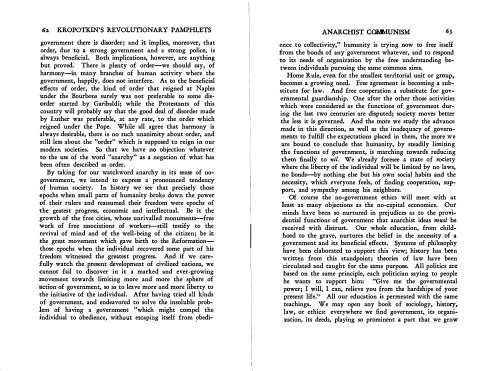Kropotkin's Revolutionary Pamphlets - Libcom
Kropotkin's Revolutionary Pamphlets - Libcom
Kropotkin's Revolutionary Pamphlets - Libcom
You also want an ePaper? Increase the reach of your titles
YUMPU automatically turns print PDFs into web optimized ePapers that Google loves.
62.<br />
KROPOTKIN'S REVOLUTIONARY PAMPHLETS<br />
government there is disorder; and it implies. moreover, that<br />
order. due to a strong government and a strong police, is<br />
always neficial. Both implications, however. are anything<br />
but proved. There is plenty of order-we should say, of<br />
harmony.,-in many branches of human activity where the<br />
government. happily, does not interfere. As to the beneficial<br />
effects of order, the kind of order that reigned at Naples<br />
under the Bourbons surely was not preferable to some disorder<br />
started by Garibaldi; while the Protestants of this<br />
country will probably say that the good deal of disorder made<br />
by Luther was preferable. at any rate, to the order which<br />
reigned under the Pope. While all agree that harmony is<br />
always desirable, there is no such unanimity about order, and<br />
still less about the "order" which is supposed to reign in our<br />
modern societies. So that we have no objection whatever<br />
to the use of the word "anarchy" as a negation of what has<br />
been often described as order.<br />
By taking for our watchword anarchy in its sense of nogovernment,<br />
we intend to express a pronounced tendency<br />
of human sOciety. In history we see that precisely those<br />
epochs when small parts of humanity broke down the power<br />
of their rulers and reassumed their freedom were epochs of<br />
the geatest progress, economic and intellectual. Be it the<br />
growth of the free cities, whose unrivalled monuments-free<br />
work of free associations of workers--still testify to the<br />
revival of mind and of the well-g of the citizen; be it<br />
the great movement which gave birth to the Reformationthose<br />
epochs when the individual recovered some part of his<br />
freedom witnessed the greatest progress. And if we carefully<br />
watch the present development of civilized nations, we<br />
cannot fail to discover in it a marked and ever-growing<br />
movement towards limiting more and more the sphere of<br />
action of government, so as to leave more and more liberty to<br />
the initiative of the individual. After having tried all kinds<br />
of government, and endeavored to solve the insoluble problem<br />
of having a government "which might compel the<br />
individual to obedience, without escaping itself from ?bedi-<br />
ANARCHIST COMMUNISM<br />
ence to collectivity." humanity is trying now to free itself<br />
from the bonds of any government whatever. and to respond<br />
to its needs of organization by the free understanding <br />
tween individuals pursuing the same common aims.<br />
Home Rule even for the smallest territorial unit or group,<br />
becomes a groing need. Free agreement is becoming a substitute<br />
for law. And free cooperation a substitute for<br />
o : <br />
ernmental guardianship. One after the other those actIvItIes .<br />
which were considered as the functions of government during<br />
the last two centuries are disputed; society moves tter<br />
the less it is governed. And the more we study the advance<br />
made in this direction, as well as the inadequacy of governments<br />
to fulfill the expectations placed in them, t he n:;<br />
or e we<br />
are bound to conclude that humanity. by steadily ,<br />
lumt , ,<br />
<br />
ng<br />
the functions of government. is marching towards redu lng<br />
them :finally to nil. We already foresee tate of SOCiety<br />
where the lirty of the individual will lImIted by no laws,<br />
no bonds-by nothing else but his own social habits and the<br />
necessity, which everyone feels, of finding cooperation. support<br />
and sympathy among his neighbors.<br />
Of course the no-government ethics will meet with at<br />
least as many objections as the no-capital economics. r<br />
minds have been so nurtured in prejudices as to the prOVIdential<br />
functions of government that anarchist ideas must be<br />
received with distrust. Our whole education, from childhood<br />
to the grave, nurtures the belief in the necessi<br />
.<br />
ty of a<br />
government and its beneficial effect . ystem of philosophy<br />
have been elaborated to support this vIew; history has n<br />
written from this standpoint; theories of law have en<br />
circulated and taught for the same purpose. All politics are<br />
based on the same principle. each politician saying to people<br />
he wants to support him: "Give me the go :<br />
ernmental<br />
power; I will, I can, relieve you from the hardshIps of your<br />
present life." All our education is permeated with the same<br />
teachings. We may open any book of sodolog ! , histo .<br />
law, or ethics: everywhere we find government, Its orgaOlzation,<br />
its deeds, playing so prominent a part that we grow

















